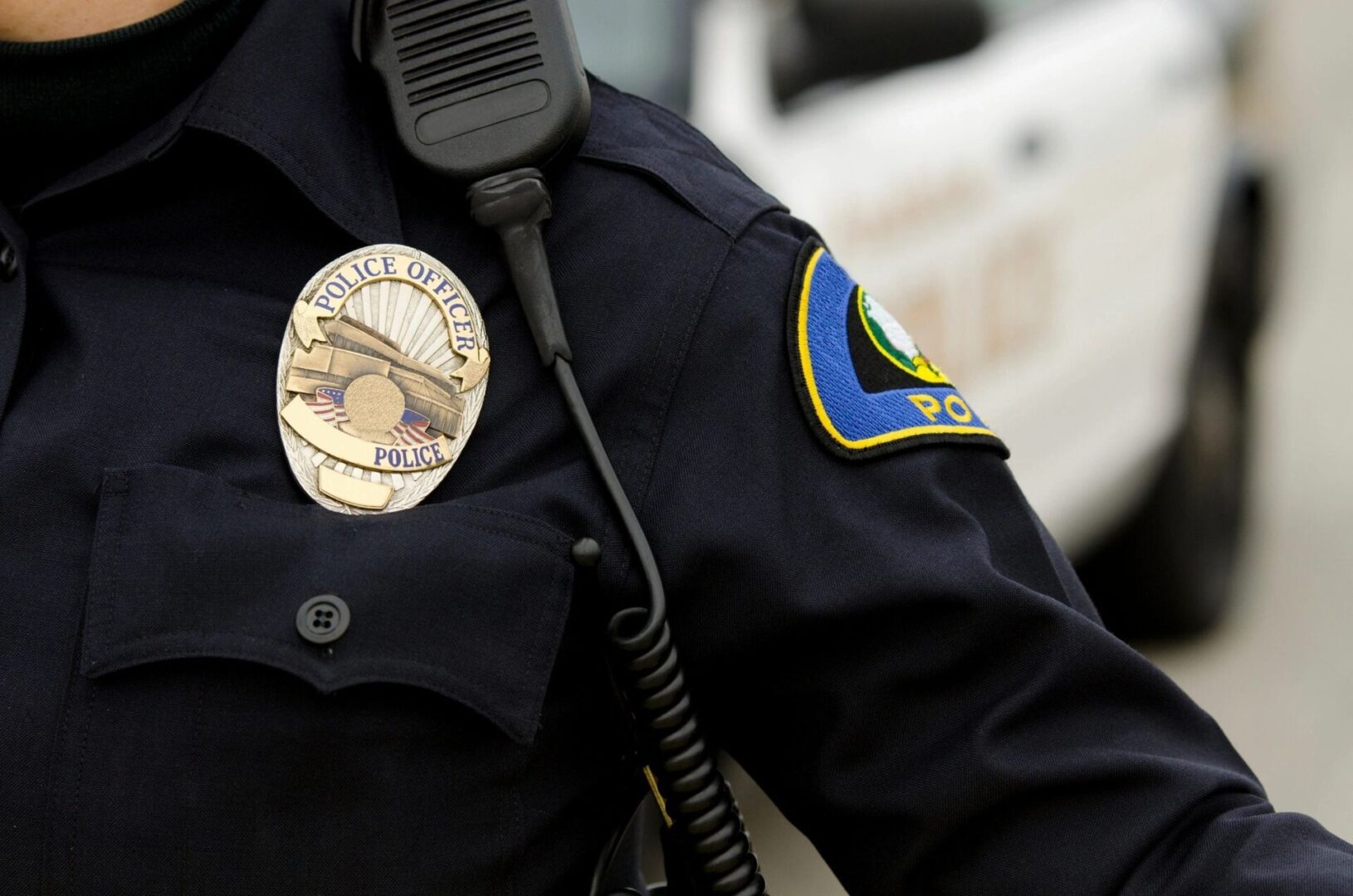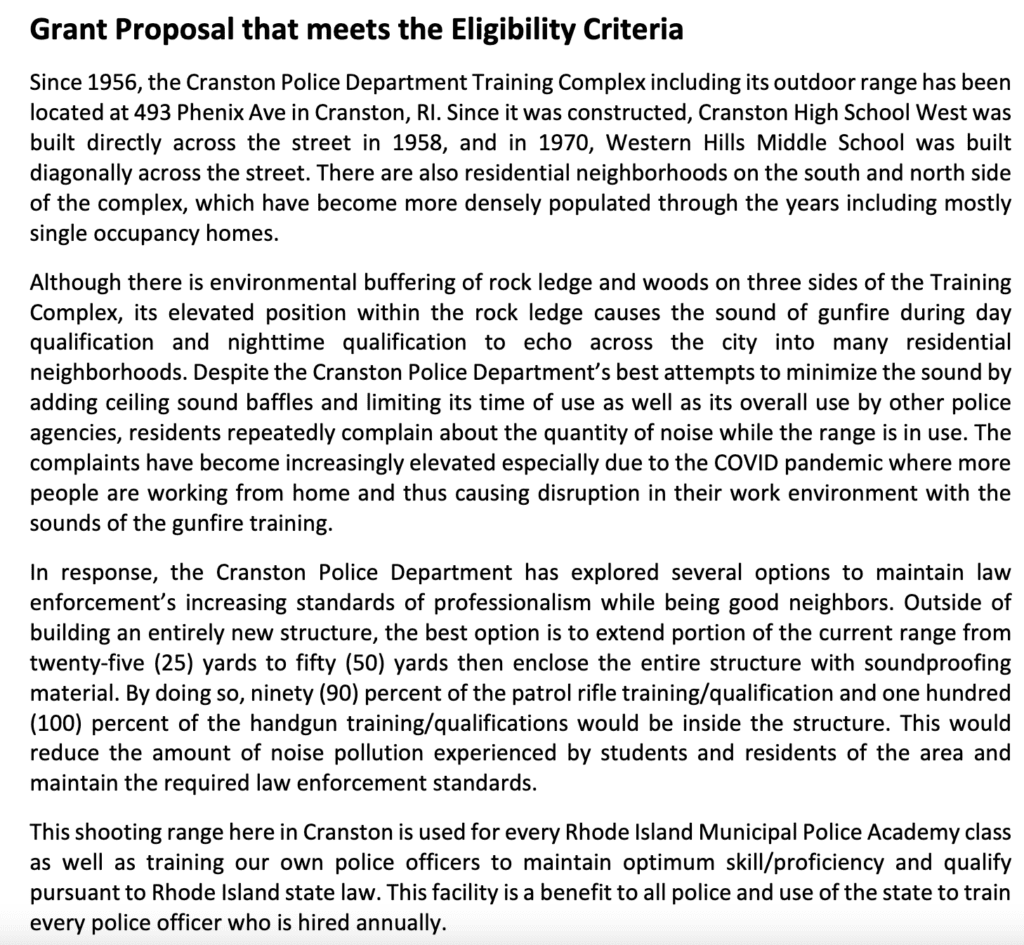Search Posts
Recent Posts
- Business Beat: Kira Greene, Compass, sells East Side Merriman House for $2,050,000 May 7, 2024
- Networking Pick of the Week: Business after Hours, Ocean Community Chamber May 7, 2024
- ART! 2024 Member Show at the First Unitarian Church May 7, 2024
- Business Beat: Nursing Home Navigator, new service at The Care Concierge of New England May 7, 2024
- Rhode Island Weather for May 7, 2024 – John Donnelly May 7, 2024
Categories
Subscribe!
Thanks for subscribing! Please check your email for further instructions.

Cranston Police Chief refutes Brown report on firing range noise, working with Mayor on changes
Discussion continues about what to do with Cranston’s Police Academy shooting range located across the street from both Western Hills Middle School and Cranston West High School. A small number of neighbors have been vocal on social media in raising concern about the disturbing noise of the firing range, and how it has increased over the years with training provided on more types of weapons and the range being used by other police entities in Rhode Island.
After residents made repeated presentations to the Cranston City Council, including playing audio recordings for the council members, a noise study was done by a Brown University student from the office of public health. “Gunfire Noise Pollution in Cranston, Rhode Island”, by student Juliet Fang, was presented at a dinner meeting held at Brown University to discuss the findings in detail with the community.
The study followed repeated attempts to secure funding to make physical adaptations to the range. Fund requests to ARPA and the Mayor’s request in the Capital Budget to the City Plan Commission were denied.
Key to any solution for the neighbors will be the identification of funds to soundproof, or make other physical changes in the building – all, so far, have been unsuccessful.
Brown University Study

At a dinner meeting at Brown, students “shared data indicating that the noise levels from the firing range were higher than what the city of Cranston legally allows.” [Fang’s] study underscored the link between noise pollution and various health issues, including disrupted sleep, heightened stress, and cognitive impairments, as well as chronic conditions like hypertension and heart disease.”
In a report on the meeting it was noted that “residents and researchers stressed the adverse effects on the community’s mental health, quality of life, and safety. They also argued that reassurances about “good” versus “bad” gunfire are beside the point; the noise was negatively impacting the learning environment and having the disconcerting effect of numbing students to the din of semi-automatic pistols, rifles and shotguns.”
“During the event, residents shared their concerns, reporting difficulties concentrating on everyday activities like putting children down for a nap, working from home, and simply being in their yards. They also expressed concerns about the normalization of gunfire in the community, which could potentially blur the lines during real emergencies – especially in this age of mass and school shootings. “During an actual emergency, we wouldn’t know who to call because we’re so used to it,” said Cranston resident and panelist, Martha DiMeo.
Citizens feel that efforts to address the issue have been met with resistance from Cranston Mayor Ken Hopkins. Moreover, despite a legislative attempt by State Representative Brandon Potter to solve the problem, little progress has been made, leaving the community feeling unheard.
Cranston residents at the event stressed the need to deal with this issue urgently, highlighting not only mental well-being and quality-of-life issues, but also the potential threats to community safety and security. They hope the data they helped collect will spark dialogue and lead to actionable solutions for the Cranston West neighborhood.”
Read the full report, here: https://sph.brown.edu/news/2023-11-16/community-noise-lab-addresses-noise-pollution-cranston
___
This week both Cranston Mayor Ken Hopkins and Chief of Police of the Cranston Police Department issued statements regarding the training range.
Cranston Police Chief Wynquist responds:
“A Brown University student recently published a news article concerning noise complaints about the Cranston Police Department. This story, “Gunfire Noise Pollution in Cranston, Rhode Island,” by Juliet Fang, is based on inaccurate information and primarily opinions and comments from a few neighbors who contacted the student and participated in the study as “so-called researchers.”
The student never contacted the Police Department to obtain factual information before publishing the article, which reads more like an editorial rather than an independent research study based on scientific data. The limited data regarding decibel readings referred to in the report is refuted by a test conducted by a trained officer using a calibrated decibel reader in a controlled setting.
The Cranston Police Department police range has been in existence since 1952. This facility is necessary to train and qualify all department members with the weapons they carry to fulfill the mission of protecting the public. The range property is zoned as “special use/open space” and designated as “public premises.”
According to the city noise ordinance, the maximum allowable decibels to the property line for this property classification is 75 during daytime hours (misreported as 55 decibels in the news story).
Certified decibel readers and officers trained to use the equipment documented that pistol and rifle fire heard in the nearby neighborhood are far below the maximum permitted levels. A sound test was performed by firing multiple shots from a pistol and rifle at the range. Simultaneous readings recorded in the nearby neighborhood registered 46.6 decibels and 48.7 decibels, respectively.
Firing at the facility is limited to an average of 65 days annually for 408 hours (17.8% of days and 4.65% of hours of the year). It is not used on the weekends, and for the limited times it is used in the evenings for low light qualifications, all firing ceases by 8:30 PM.
Over the past two years, we have made many changes to mitigate the noise, including reducing the number of outside police departments using the range and excluding rifle fire by external agencies.
The most impactful change made in April of this year was discontinuing the use of the facility by the Rhode Island Municipal Police Training Academy. The academy previously used the range for 20 days per year, training close to 120 police recruits.
We have explored enclosing the range to make it an indoor facility but were unsuccessful in obtaining grant funds. We will continue to seek other sound mitigation measures if funding should become available.”
Respectfully,
Colonel Michael J. Winquist, Chief of Police, Cranston Police Department
___
Funds denied
In 2022, Col. Winquist had submitted a request for ARPA funds – the application was for $1.6 Million and it was denied.
There was also a failed legislative bill submitted by Rep. Potter that, if passed, would have made the location of the range illegal because it was near a school.
The application is here: https://rinewstoday.com/wp-content/uploads/2023/11/Cranston-Police-Shooting-Range-Noise-Mitigation.pdf – and the narrative of the application:

___
Cranston Mayor Ken Hopkins’ statement:
“I appreciate the concerns of certain residents regarding the use of the Cranston Police range.
To that end, since taking office, in working with the CPD we have taken action to reduce the volume, hours of use, and number of law enforcement agencies using the range.
Earlier this year, my administration applied for a multi-million-dollar state grant to provide funding to mitigate sound impacts from the range. Unfortunately, this application was not granted.
Additionally, this year, I proposed that capital funds be budgeted to enclose the range to virtually eliminate external sound. Despite my proposal and encouragement, the City Plan Commission voted to eliminate the police shooting range from my capital budget request.
Again, I empathize with the concerns expressed by residents regarding noise from the range and will further explore avenues to fund and support possible solutions. In the meantime, I must be clear that I maintain my unwavering support for the training and development of the members of the Cranston Police Department.” – Ken Hopkins, Cranston Mayor
___
The City Planning Commission
Jason Pezzulo, Cranston City Planning Commission responded to our inquiry about why the funds were denied. His response:
“Are you referencing the City Plan Commission recommendation on the Capital Budget that took place back last winter? If so, those minutes are available on the Secretary of State’s website. Beyond that, the Plan Commission has not discussed the firing range in any other format.”
With the help of the Mayor’s office, we were provided those minutes of the Planning Commission, and here are excerpts of the discussion of the shooting range:
“…Finally, he said the Administration still views the proposed police shooting range as a priority, although the requested funds are a placeholder in anticipation of a clearer estimate coming from future engineering studies, and the Highway Department’s two generators for its Phenix Ave facility need to be replaced.
Lastly Mr. Frias asked if other police shooting ranges in the state were typically enclosed. Mr. Bernardo said it seems to be the case around 50% of the time; Warwick’s range is not enclosed, but Cranston’s is exceptional in its usage. Chairman Smith asked if the plan would be to improve or to relocate. Mr. Bernardo said both options would be examined in the eventual feasibility study.”
Neighbors
Martha DeMeo, representing the group of neighbors who have spoken up about the noise did not submit a statement for this follow-up story, per our request.
This is a developing story.
___
Our last story on the Cranston shooting range issue:
